Croatian Ambassador to Bulgaria Summoned Over Milanović's Statement
ZAGREB, 20 May (Hina) - Croatia's Ambassador to Bulgaria, Jasna Ognjanovac, was summoned by the Bulgarian Foreign Ministry on Wednesday over President Zoran Milanović's statement in which he strongly criticized "Bulgaria's policy towards the European integration of North Macedonia," Bulgarian media reported.
Ognjanovac was summoned at the request of Minister Svetlan Stoev, and she was received by the Director General for European Affairs, Rumen Alexandrov.
The reason for the meeting was President Zoran Milanović's statement after a summit of the Brdo-Brijuni Process at Brdo Pri Kranju, in which he sharply criticized Bulgaria's policy towards the European integration of North Macedonia, the Bulgarian BNT broadcaster said.
Alexandrov called Milanović's statement "unacceptable and unwarranted".
He said that it was "disappointing not just in the context of the excellent bilateral dialogue between Sofia and Zagreb and their unanimity on a number of topics on the European and regional agenda, but also in view of the fact that being the region's immediate neighbors, Bulgaria and Croatia are naturally bonded by a shared interest in the reform, stabilization and EU integration of the Western Balkans in the near future."
In a statement to reporters at Brdo Pri Kranju, Milanović warned that North Macedonia "is in an impossible position" and that one EU member state demanded that North Macedonia "define its national genesis in the way requested by the neighboring state" in history textbooks.
He said that he would "openly oppose" that within his powers.
Milanović did not name the state but meant Bulgaria, which is rejecting a negotiating framework for North Macedonia because Sofia claims, North Macedonian textbooks "revise and negate their common ethnic and linguistic history."
The Croatian ambassador said she would convey the Bulgarian position to Zagreb, noting the need for cooperation between Bulgaria and Croatia with a view to guaranteeing the stability of the Western Balkans and the region's European perspective, BNT said.
The Croatian Foreign and European Affairs Ministry confirmed to Hina that Ambassador Ognjenovac had been to the Bulgarian Foreign Ministry where the Bulgarian side conveyed to her its position.
For more about politics in Croatia, follow TCN's dedicated page.
Milanović Supports EU Integration of Western Balkans as Soon as Possible
ZAGREB, 16 May, 2021 - Zagreb and Ljubljana are here to help their Western Balkan friends join the European Union because that is in everyone's interest, just as it is presumably in Slovenia's interest that Croatia enters the Schengen zone, Croatian President Zoran Milanović said in the Slovenian lakeside resort of Bled on Sunday.
Milanović and his Slovenian host Borut Pahor held a working meeting ahead of the annual Brdo-Brijuni Process summit on Monday. The two presidents are the co-chairs of this initiative.
Over the last ten years, the Brdo-Brijuni Process has shown that "it makes perfect sense," Milanović told the press before meeting Pahor, according to a press release from the Croatian president's office.
"We are here to encourage and help our friends and neighbours from the Western Balkans, basically the countries of the former Yugoslavia plus Albania, to join the European Union as soon and as simply as possible because that is in everyone's interest," the Croatian president said.
Milanović said he presumed it was also in Slovenia's interest that Croatia should join the Schengen zone as soon as possible.
"All this is part of a broader story in which we will do all we can, notably our governments, but we too, so that our neighbours become, as soon as possible, part of the community which we belong to," Milanović said. "After all, Europe is one and should be one because whenever it was divided in the past it was not good," he added.
Milanović called for cooperation despite differences.
"We do not have the same views on all issues, but I believe that our views are compatible and can produce a result," the Croatian president said. He said he was optimistic and expected a good meeting on Monday.
The Brdo-Brijuni Process was launched by Croatia and Slovenia in 2013 to address open issues through regional cooperation, stabilise the situation in southeast Europe and create conditions for EU enlargement.
For more news about politics in Croatia, follow TCN's dedicated page.
For more news about Croatia, CLICK HERE.
PM Defends His Government's Proposal to Partly Ban Sunday work
May 8, 2021 - Prime Minister Andrej Plenković on Saturday defended his government's proposal to partly ban Sunday work, rejecting President Zoran Milanović's assessment of the proposal groundless and describing his statements to the press as political barbarism and rudeness.
Earlier in the day, Milanović told the press that Plenković's speech on the ban was insincere and a gimmick ahead of the 16 May local elections.
"I did not see what he said. I presume he is still on the campaign trail trying to keep the remaining SDP pockets in the counties, municipalities, and towns alive because what he is doing is a local campaign by the President of the Republic, a former leader of the SDP (Social Democratic Party), which has never been seen before. But I guess this is a new outlook on democracy along the lines of all those salvos of insults directed at other political actors, such as the HRT (public broadcaster), your journalist colleagues in Split," Plenković told the Croatia media in the Portuguese city of Porto where he was attending the EU Social Summit.
"That's outrageous! I expected that the HRT and its reporters, who are otherwise quick in contacting the European Federation of Journalists, would promptly respond and seek protection as they have in the past, that they would condemn that act. Such political barbarism and rudeness towards the media is unprecedented, it is a new dimension, and we should talk about it," he added.
Milanović commented on the statement made by Plenković in Porto on Friday that a ban on Sunday work would be good for "balance between work and family life."
"(Milanović) obviously did not follow last year's election campaign for the Croatian Parliament because that was one of the key messages from our election manifesto. Over the previous months, we have been working thoroughly on the proposal to amend the Commerce Act, conducting consultations and surveys. A majority of Croatian citizens are in favor of banning Sunday work. Since Croatia is a tourist country, businesses would be allowed to work on 16 Sundays a year, whereby all the needs of the tourist season would be met," the prime minister said.
"At the same time, shopping centers would be allowed to work on holidays, and balance would be achieved between work activities and family life. It is a well-balanced and appropriate proposal that will be put to public consultation and come before Parliament, and it is in no way connected with this election campaign. After all, proposals like this are not adopted by local councils or elected leaders but by the Croatian Parliament," Plenković concluded.
For more, follow our politics section.
Milanović: Government's Proposal on Sunday Work an Election Gimmick
May 8, 2021 - President Zoran Milanović on Saturday reiterated his view on Sunday work, saying that the government's plan to ban Sunday work partly was an election gimmick.
Prime Minister Andrej Plenković announced amendments to the Commerce Act on Thursday, under which the number of Sunday shopping days would be limited to 16 a year. He said that the move was not contrary to the government's desire for greater employment and higher growth, stressing the need to balance work and family life.
Answering questions from the press during a visit to the eastern city of Đakovo, Milanović said that the government's proposal was insincere. "It's always the same election gimmick by the government. They don't need it. Again, it won't change anything," the President said.
"People work from morning to night, and they don't have time to go shopping" except on Sundays, he said, noting that he personally would prefer if shopping centers were closed on Sundays, "but that is not about work." He said that another problem was that "we would be telling people when they can go to the shops."
Milanović said that he personally does not go shopping on Sundays but that he is aware that most people "do not have this comfort."
Asked to comment on the union's proposal for workers who are not union members to be taxed, Milanović said that he generally supported the work of the unions, particularly those in private companies.
"However, this has become very difficult because of atomization. People used to work in large companies, and it was relatively easy to organize them, while that is more difficult today. This is now reduced to public-sector unions in which fewer people work because most work in the private sector. If the unions are weak, the employers will trample them. The state is still the most decent employer," Milanović said, reiterating that "in the end, it all boils down to the trade unions in the public sector, state administration, and hospitals."
For more, follow our politics section.
President and Government Condemn Borovo Incident
ZAGREB, 2 May 2021 - President Zoran Milanović has condemned an incident that occurred in the eastern town of Borovo on Sunday morning when a group of young men chanted anti-Serb slogans, calling it shameful and heinous hate speech.
"In Borovo today a group of men tried to incite violence using heinous hate speech against our fellow citizens Serbs. That is a disgrace and deserves absolute condemnation," Milanović wrote on Facebook.
He criticized the police, whom he called the police of Prime Minister Andrej Plenković and Serb leader Milorad Pupovac, for not taking pre-emptive action to prevent the incident.
The Vukovar-Srijem County Police Department has confirmed that around 6.30 am on Sunday, after laying wreaths at the monument to 12 police officers killed by Serb paramilitaries 30 years ago, a group of about 20 young men went into the town chanting anti-Serb slogans, including "Kill the Serbs". The police responded promptly, identifying the perpetrators. Footage of the incident was posted on the town's Facebook account.
Government strongly condemns the incident
The government also strongly condemned the incident, calling it a scandalous act of provocation and hate speech by a group of football fans. It said that it would always oppose and condemn hate speech against any fellow citizens.
"In Croatian society, there is no room for such outrageous behavior and intolerance towards members of the Serb ethnic minority, who celebrate Orthodox Easter today, or any other minority," the government said in a statement.
"We will always strongly oppose and clearly condemn the stirring up of hatred against any of our fellow citizens. The Croatian police responded promptly and are investigating to bring those responsible to justice," the government.
For more about politics in Croatia, visit our dedicated section.
Milanović: Eternal Praises to Croatian Heroes!
ZAGREB, 1 May 2021 - President Zoran Milanović laid a wreath in the eastern town of Okučani on Saturday in tribute to Croatian soldiers and police officers killed in Operation Flash during the Homeland War 26 years ago.
On this day in 1995, "with their knowledge, patience and courage, Croatian heroes liberated this part of Croatia," Milanović said, adding that Operation Flash, and 1993's Operation Maslenica, had paved the way for Operation Storm in August 1995 that ended the four-year Serb armed insurgency in the country.
"While we others were in Zagreb, Geneva, in administrative services, a small number of men fought here. Eternal praises and glory to the Croatian heroes!" the president said.
Milanović's delegation included the Chief of the General Staff of the Croatian Armed Forces, Admiral Robert Hranj, presidential adviser on defence and national security Dragan Lozančić, presidential adviser on Homeland War veterans Marijan Mareković and high-level military commanders.
For more about the homeland war in Croatia, follow TCN's dedicated page.
Milanović Attends Proština Rebellion Centenary
April 17, 2021- President Zoran Milanović attended a ceremony in Marčana on Saturday, marking the Proština Rebellion centenary, saying that Nazism and fascism were extremisms of hate and that communism was the extremism of human and noble hope.
"That difference, apparently only verbal, is actually essential," he said.
The Proština Rebellion in Istria County was one of the first anti-fascist uprisings in Europe.
Milanović laid a wreath and lit a candle at the monument to the revolt and said that little was known in Croatia about the resistance of the villagers of Proština.
Living in Istria has become chic
"Today Istria can be proud of everything it built and is building. This is a tolerant, progressive, pleasant environment where people wish to live. It's become chic in a way. This status was not won quickly or easily," he said, adding that the story of Istria was a story of success, "of a success which lasts despite the coronavirus crisis, which will pass."
"Today we have a beautiful, successful, tolerant, gentle, but energetic place where good and ambitious people live," Milanović said.
Former president Stjepan Mesić said it would have been good if the victory in WWII had meant the end of fascism but that it was not quite so as many equated communism and fascism.
"Communism is a mega idea which could be only a world idea and it is unachievable. Fascism is dangerous as it can occur in small communities to develop and endanger the world. Unfortunately, even today we have attempts by revisionists who think they can turn those defeated in World War II into the winners. Obviously, that can succeed and it's up to us to oppose that," Mesić said.
Pula mayor: We don't allow anti-fascism to be besmirched
Istria County acting prefect Fabrizio Radin and Pula mayor Boris Miletić said that anti-fascism, as the lasting commitment of the people of Istria, was lived in the county on a daily basis.
"That struggle began in early 1921 here in Istria with the rebellion of villagers against the fascist terror. Occurring almost simultaneously as the Proština Rebellion was the Labin Republic, that is the uprising of Istrian miners which is considered the first antifascist uprising in the world," Miletić said, adding that in Istria anti-fascism had always been unsullied.
"We don't allow anti-fascism to be besmirched and speak loudly against anyone doing that. We nurture those true democratic values and continue to pass them on to younger generations," he said.
For more news about Croatia, follow TCN's dedicated page.
Highlights of the Week: 5 Big Events in Croatia from March 29 to April 4, 2021
April 4, 2021 - From new epidemiological measures imposed due to the increase in COVID-19 infections to the arrival of Ryanair, here are TCN's five highlights of the week, recapping the big events in Croatia from March 29 to April 4, 2021.
At the end of March, the fight against the pandemic was in its final stages, taking into account the government's efforts to promote the return of the tourist season, the reopening of business in the country, and the announcement of mass vaccinations in Zagreb after Easter. Despite this, the novel coronavirus has once again warned that its presence continues to threaten the population, and this has since manifested in the increase in cases across the country. On the other hand, sporting and cultural events have also stood out as we entered a new month this week.
Croatia U-21 reaches the EURO Tournament Quarterfinals
The eyes were not only all firmly on the senior team, who, after starting the qualifying process with an away loss against Slovenia, got back on track with six points against Cyprus and Malta in Rijeka. Luka Modric also became the most capped player in the history of the Croatian National Team.
Some good news also came for those who follow the younger generations, as the U-21 team won their ticket to the quarter-finals of the EURO tournament in a dramatic fashion. Those led by Igor Biscan failed to win the match, but a Bradaric goal in injury time allowed Croatia to climb to second place, thanks to the other teams' results and goal difference.
Now, the little Vatreni will have to face Spain on May 31.
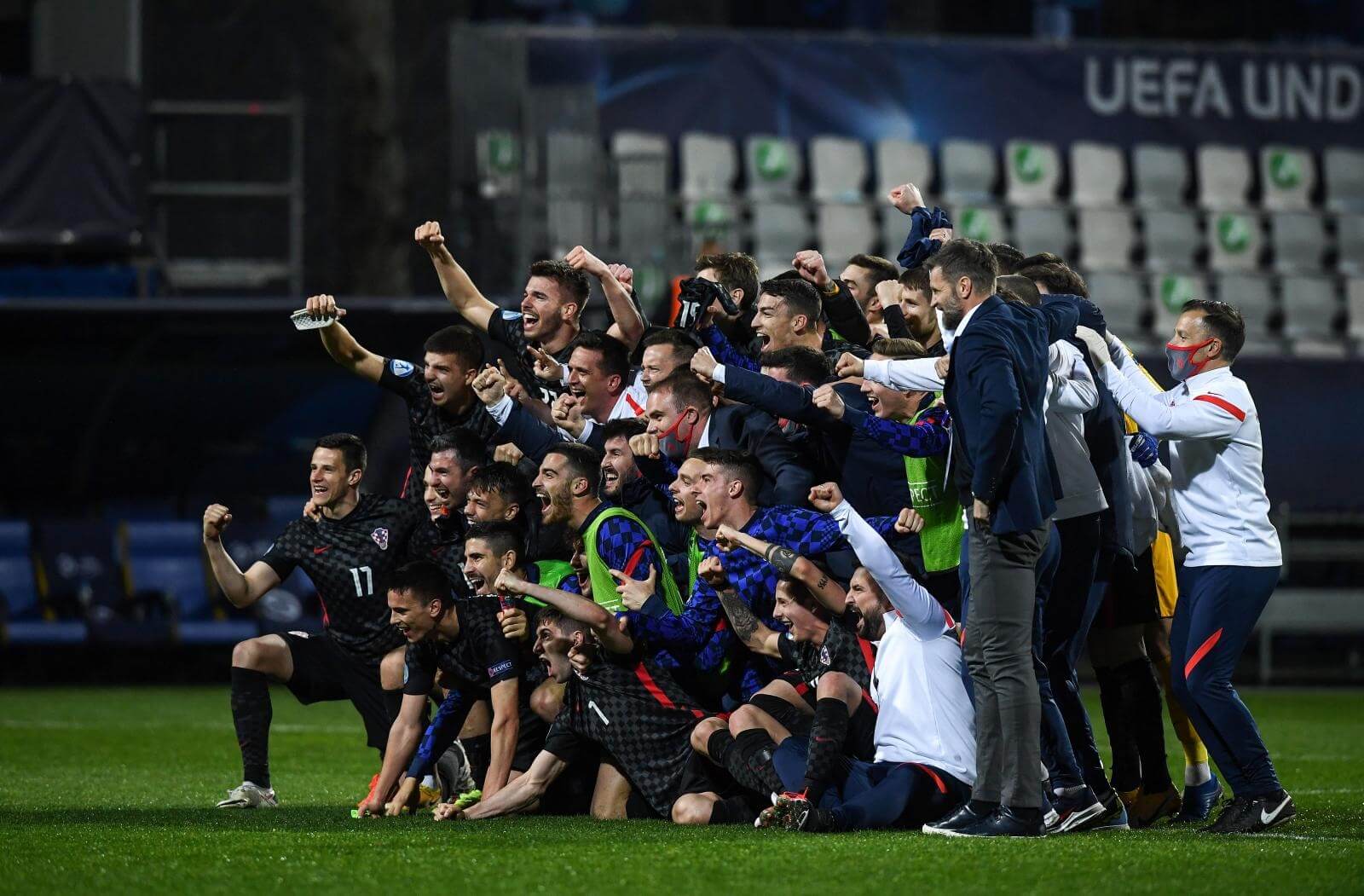
Koper, Slovenia (Credit: PIXSELL)
Ryanair announces flights to Croatia
After several years in which the Zagreb International Airport was in deficit in terms of both airlines and low-cost flights, it finally reached an agreement with the well-known Irish low-cost company Ryanair. This agreement was announced through a virtual press conference, in which it was detailed that the capital of Croatia will now be connected to European cities such as Paris, Brussels, Dortmund, Frankfurt, Karlsruhe, Memmingen, Milan, Rome, Podgorica, Oslo, Gothenburg, and London.
Zagreb wasn't the only city to rejoice with this news, as the airline also confirmed 17 new flights to Zadar International Airport in a separate conference, and passengers will be able to choose from a wide variety of European destinations from July 2021. While many still believe this news might affect the future of Croatia Airlines, others including the company itself assure that the regional base establishment of the popular airline in Zagreb will not only create more jobs but also transform the capital's tourism.
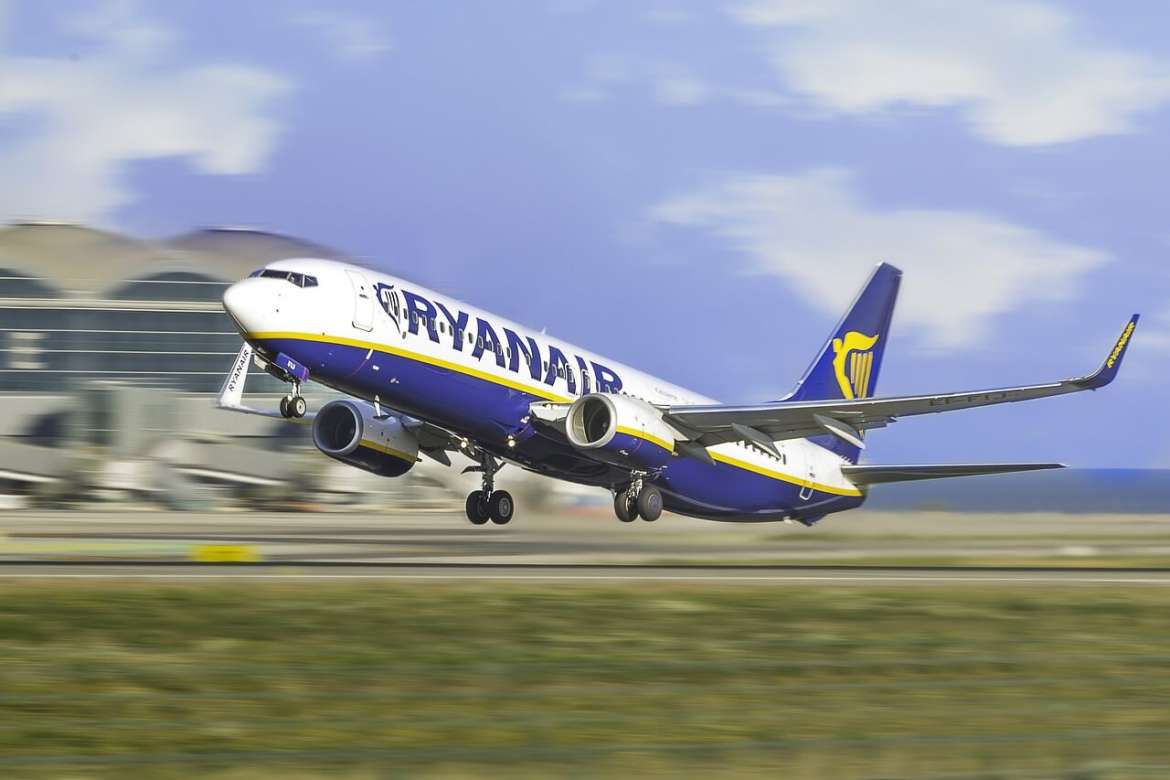
Credits: Pixabay
The Prime Minister reveals the National Recovery Plan
After a cabinet meeting which was held last Thursday, PM Andrej Plenkovic announced through a press conference all the details surrounding the National Recovery and Resilience Plan, which aims to reform and transform the country in regard to several different issues such as healthcare, employment, education, science and research, infrastructure, and more. The estimated investment would stand at 18 million kuna and the objective is to carry out these reforms within five years, more precisely between 2021 and 2026.
Plenkovic added that the plan consists of modernising scientific research and educational systems, increasing the quality of the healthcare and pension systems, improving employability through a more efficient programme, and carrying out the reconstruction and structural renovation of numerous homes and buildings in the country, in such a way that they are not only better prepared in case of natural disasters, but that they're also more adapted to the most recent demands for energy efficiency.
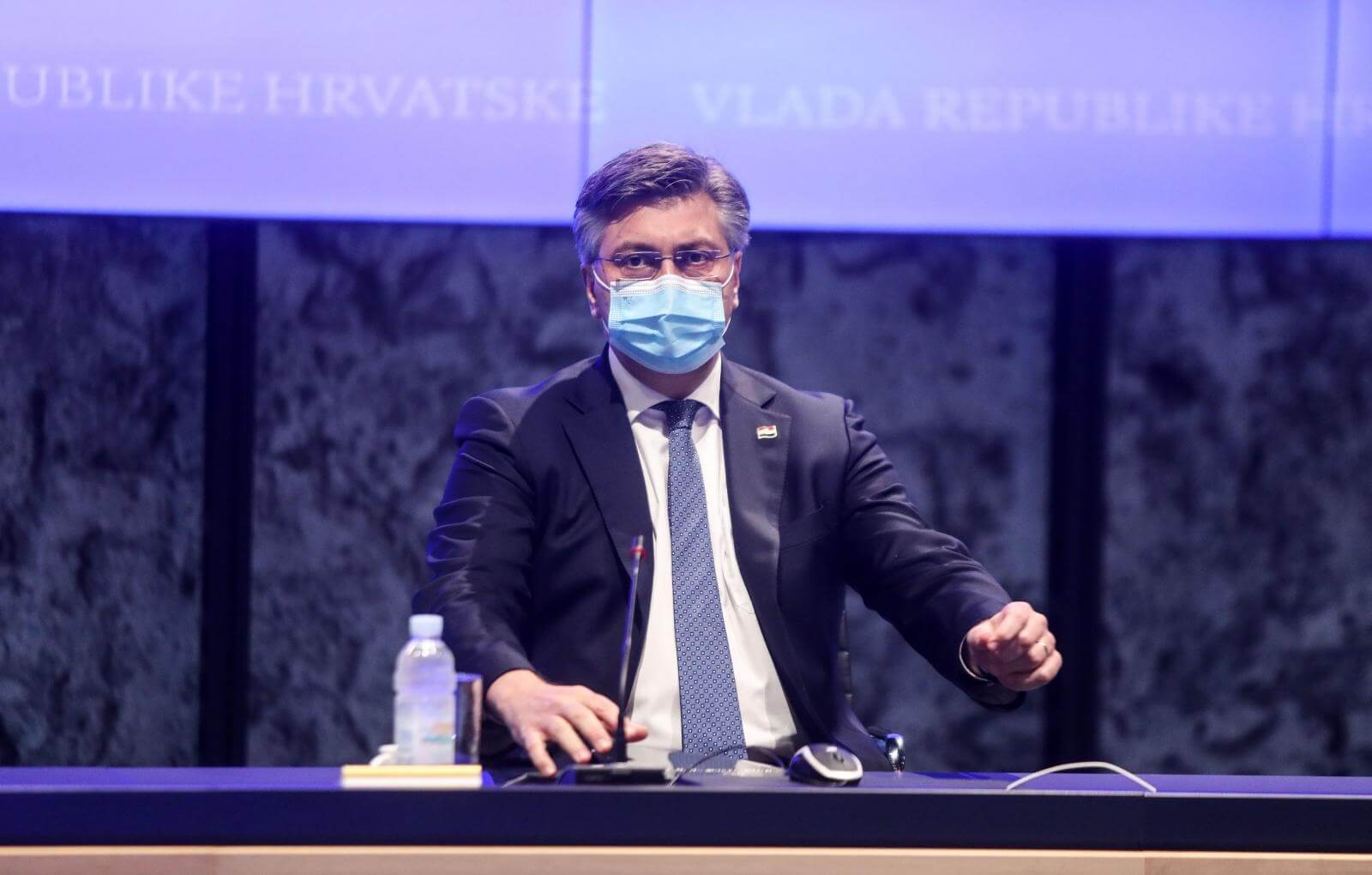
Zagreb (Credits: PIXSELL)
The traditional Za Krizen Procession was held on Jelsa
Despite the reduced capacity of followers and pilgrims this year due to the coronavirus pandemic, the island of Hvar celebrated its 2021 edition of its traditional Za Krizen (Behind the Cross) procession in the town of Jelsa, inscribed as intangible UNESCO heritage since 2009. TCN covered an event that usually gathers thousands of people around the island as they follow the carriers, but this year had to settle with only the participants and few witnesses in the streets.
The overnight processions were held in the towns of Jelsa, Pitve, Vrisnik, Svirce, Vrbanj, and Vrboska. The event started simultaneously in the six towns at 22:00 pm as the habitants have done for centuries, and ended at the main square.
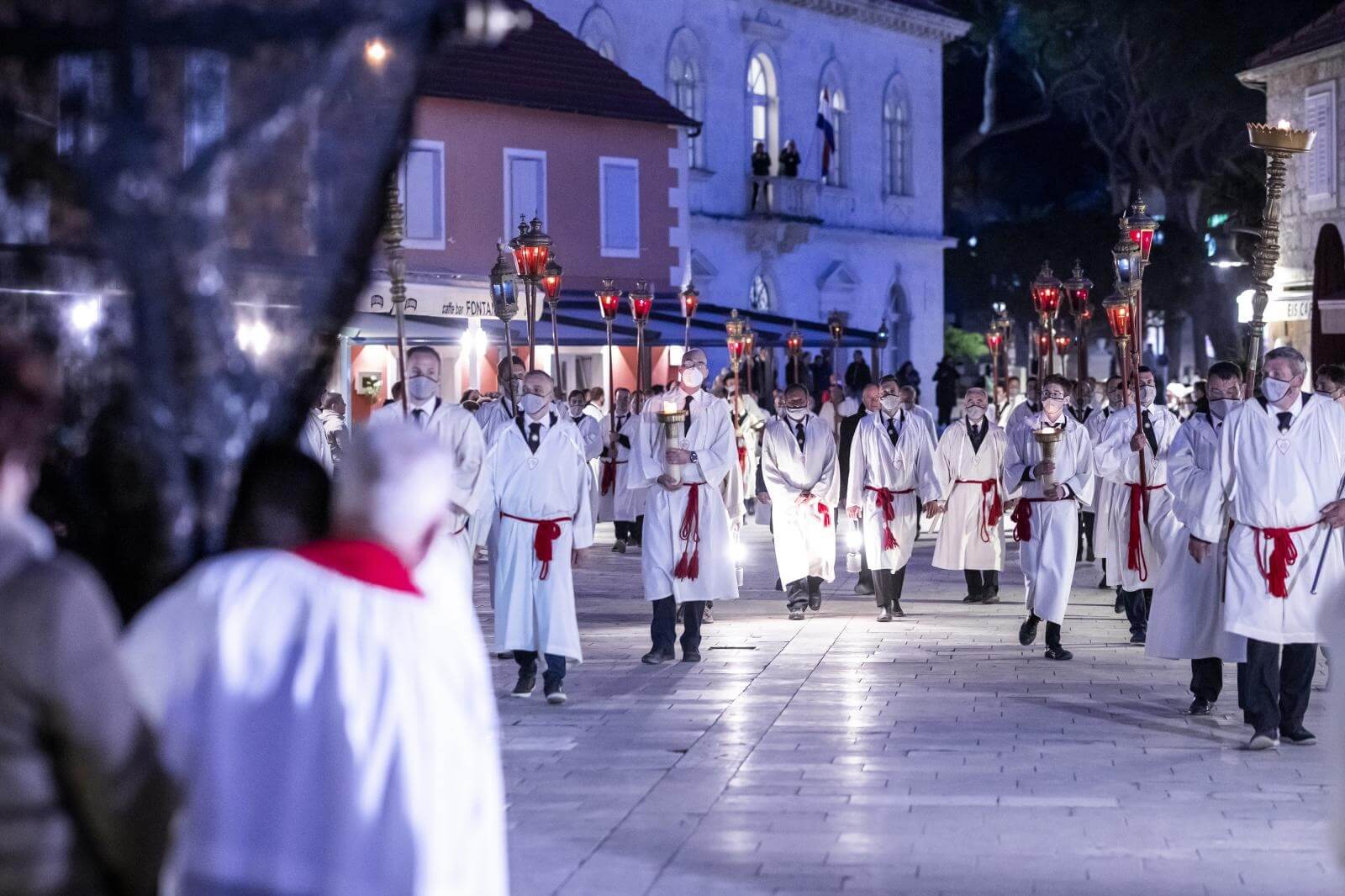
Jelsa (Credit: PIXSELL)
The measures against COVID-19 are tightened due to the large increase in cases
A month ago, all the cafes, bars, and restaurants in the country were reopened, after many weeks without serving their loyal customers, as an extreme measure to combat the virus. The condition was to serve only outdoors on the terraces and with a limited capacity. The streets were filled with life and joy again. However, one month later, the numbers have dramatically increased and although it is unlikely that a complete lockdown will be imposed again, the government has announced that new measures will take place in order to reduce the infections and it will last until 15 April, before being reviewed again.
In Split-Dalmatia County, for instance, which has seen a big increase in new infections, the mandatory wearing of face masks at outdoor venues with an increased flow of people will be introduced, as will a ban on the sale of alcohol from 8 pm to 6 am. The work of cafes will be restricted until 8 pm, and it will be possible to serve food and drinks only in the open. Foreign language schools will switch to online classes again.
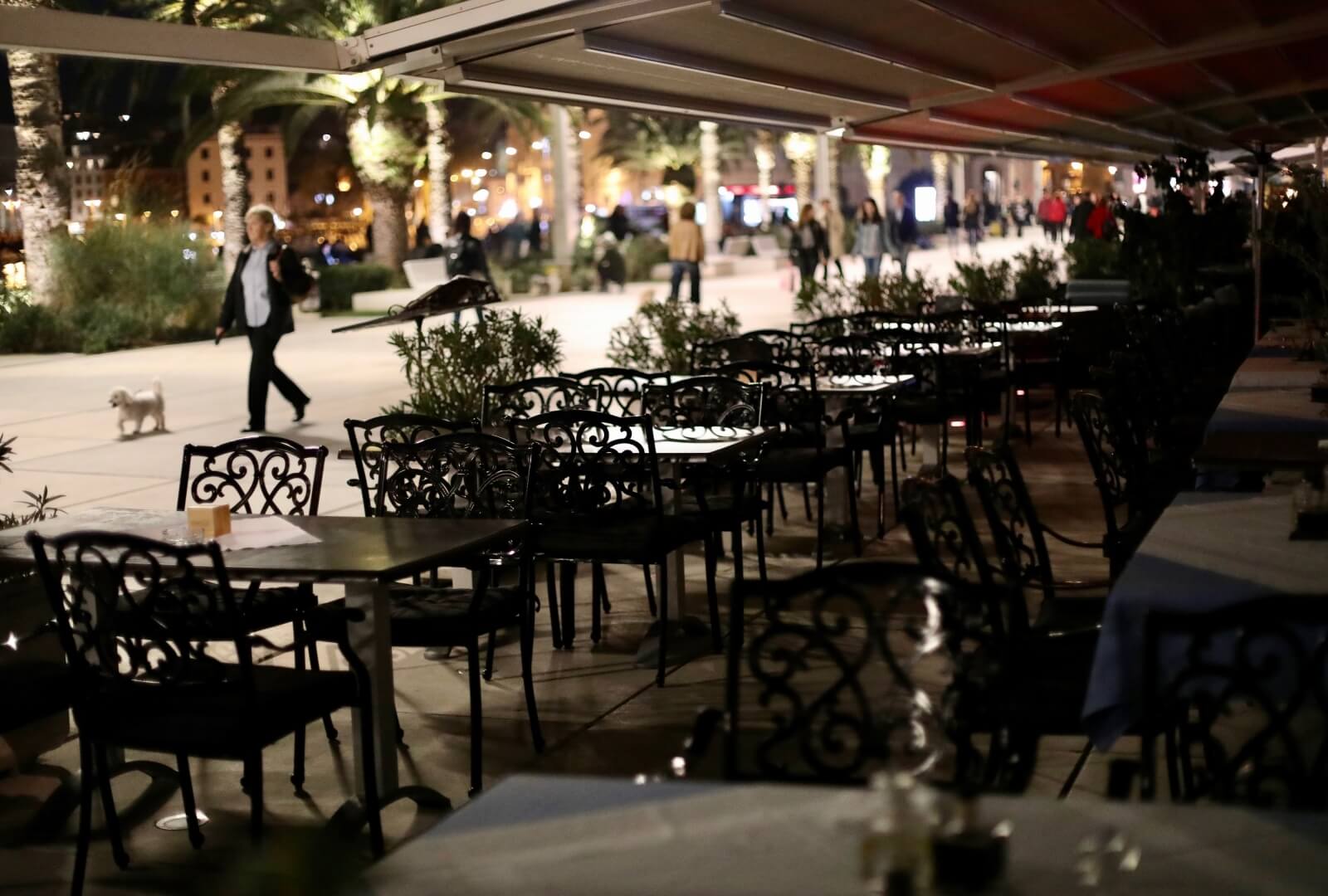
Split (Credit: PIXSELL)
From Monday to Sunday, we list five events featured on the front pages of Croatia's news portals.
To follow all news from Croatia, subscribe to our newsletter.
Milanovic: I've Apologised, I Am a Lot More Stable than Plenkovic
ZAGREB, Sept 28, 2020 - President Zoran Milanovic said on Monday that he had apologised to everyone he had offended with his way of communicating and that he was more stable than Prime Minister Andrej Plenkovic.
"I have apologised, it (the manner of my apology) can be ironic but is not insulting. I did not call anyone mad. I did not turn on anyone physically in parliament. I don't see what the fuss is about. For someone to tell you to stabilise, what does that mean? I am more stable than he is," Milanovic said.
Milanovic's latest comment ensued after a reply from the government to his request for a meeting with Plenkovic to discuss the Janaf graft that he (Milanovic) first needs to apologise to everyone he has insulted and to calm down.
Later War Veterans' Affairs Minister Tomo Medved commented on Milanovic's apology saying that it did not appear to be an apology but the continuation of unacceptable dialogue.
I wouldn't go back to the "club"
Milanovic told reporters that he had visited a club owned by former Janaf CEO Dragan Kovacevic, twice in the company of a "very small group" and that he would not go there ever again.
"He was the CEO of Janaf. I start from the point that he must be someone who represents something, and he is someone I have known for some time. I was in the company of a completely different group. I did not go there on St. Martin's and especially not since I was elected. Some fish arrived from Split and no one wanted to buy it so we went and ate what was left," he said.
Asked whether it was appropriate that he as the president went to the "club" during lockdown, Milanovic told reporters to stop with that "demagogy."
Both the President and Prime Minister continued their work during the entire time of the lockdown and meet with their associates and during that time 50% of the population went to work too, he recalled.
"This is to ridiculous. Was I supposed to stay home and consult with my associates via 'zoom'," he asked and claimed that a certain level of trust has to exist.
Asked whether a visit by US State Secretary Mike Pompeo can be related to certain strategic management projects, Milanovic said that it can be related to the US presidential election.
"They did not remember us for four years. Now, the visa regime is being abolished, that should have been done long ago. We are treated as a security problem and that's that. We in fact did not have any relations with the US for the past four years," he said.
For the latest travel info, bookmark our main travel info article, which is updated daily.
Read the Croatian Travel Update in your language - now available in 24 languages
Milanovic: Croatia Needs Strong, Fair, Uncorrupted Local Government
ZAGREB, Sept 28, 2020 - President Zoran Milanovic said on Monday in Donji Miholjac that Croatia needed a strong, fair, uncorrupted local government and a central state that would always have to ensure equal standards.
At a special session of the Donji Miholjac Town Council, held on the occasion of the town's day, Milanovic said that the area was not remote but that it was on the sidelines a bit so it had not made as much progress as it should have in the last 30 years, which was obviously the price the entire Slavonia was paying.
He said that European funds should be used for further development. The government is trying hard, but in the end, it is on the best and the most hard-working among you to ensure that the money really comes here, said Milanovic.
Talking about the system of local self-government, he recalled his earlier speeches when he said that the existing model of counties was sustainable. Croatia perhaps does not need 502 units of local self-government but it cannot have 100 either, as was the case in socialism, because that is not good.
"Maybe some municipalities will disappear but that is more an exception than a rule because decisions on life and basic matters are made where people live," Milanovic said.
Osijek-Baranja County prefect Ivan Anusic recalled that in the past three years the County had invested HRK 22.9 million (€3 mn) in projects in the area of Donji Miholjac, adding that a project for an irrigation system for 682 hectares of land, worth nearly HRK 87 million (€11.5 mn), was in the pipeline.
Donji Miholjac Mayor Goran Aladic said that a new secondary school with a sports hall, worth over HRK 50 million (€6.6 mn), was under construction, that over HRK 3 million (€398k) had been invested in a kindergarten, and that the road from the centre of Donji Miholjac to the border with Hungary, worth HRK 9 million (€1.2 mn), had been finished.
Aladic said that projects together worth over HRK 65 million (€8.6 mn) were currently underway in the town.
For the latest travel info, bookmark our main travel info article, which is updated daily.
Read the Croatian Travel Update in your language - now available in 24 languages


